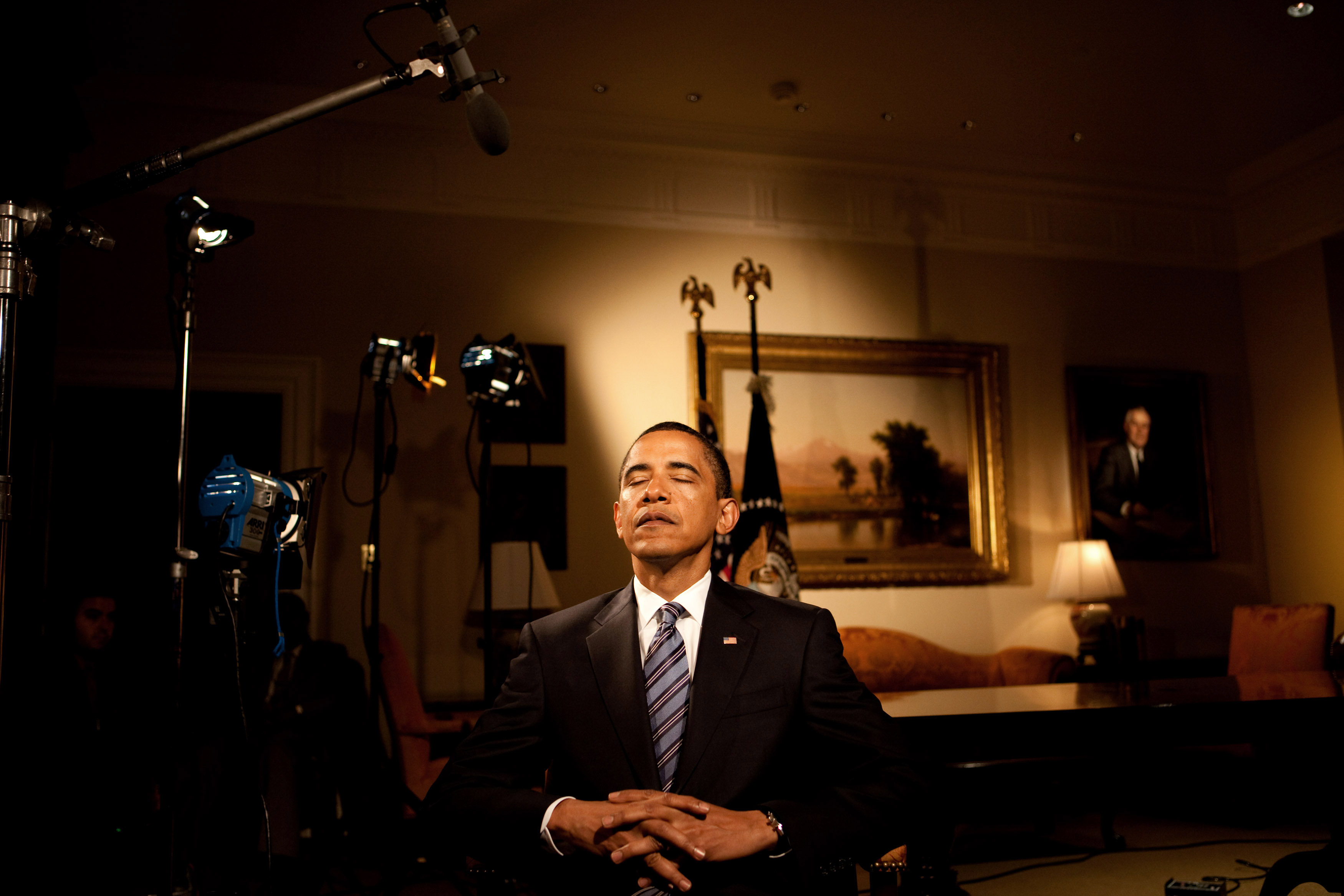The strange serenity of Barack Obama
He accepts the things he cannot change, and tries to change the things he believes he can


President Obama disappointed liberal detractors and admirers alike last week when, in his last press conference of the year, he did not go ballistic about Russian efforts to tip the presidential election to an unqualified and bigoted clown, but instead spoke about Russia's electoral meddling in the slightly-bored tone of a medical examiner.
What exactly did liberals expect? The declaration of a national emergency? Some kind of ex officio delegitimizing of the president-elect? A Rudy Giuliani-style gambit to hang onto the presidency?
None of that is Barack Obama's style. Indeed, for better and worse, Obama has been the Serenity Prayer president.
Subscribe to The Week
Escape your echo chamber. Get the facts behind the news, plus analysis from multiple perspectives.

Sign up for The Week's Free Newsletters
From our morning news briefing to a weekly Good News Newsletter, get the best of The Week delivered directly to your inbox.
From our morning news briefing to a weekly Good News Newsletter, get the best of The Week delivered directly to your inbox.
God, grant me the serenity to accept the things I cannot changeCourage to change the things I canAnd wisdom to know the difference. [Serenity Prayer]
This is our president. He accepts the things he cannot change, and tries to change the things he believes he can. In political rather than spiritual terms, Obama's presidency has seemingly toggled between resignation and targeted, bold strikes.
Rewind to January 2010, when Scott Brown, a little-known Massachusetts Republican, won a special election to replace the late Sen. Ted Kennedy — robbing Obama of his 60-seat supermajority in the Senate. Though counseled to moderate his healthcare reform proposal, Obama famously told aides "I feel lucky" and committed to an aggressive plan to push through a portion of the bill under Senate budget-reconciliation rules, thereby avoiding a Republican filibuster. Senior strategist David Axelrod recalled Obama's thinking thusly: "I get the politics of this, but if we don't do this now, it probably wouldn't happen … Are we going to put our approval rating on the shelf and admire it for eight years, or are we here to spend our political capital and try and do things of lasting importance for the country?"
The Serenity Prayer famously asks for wisdom to know the difference between changeable and unchangeable situations. On healthcare, wisely or not, Obama boldly chose to push for change. He succeeded. And he paid the price.
After the disastrous 2010 congressional midterm elections, Obama, reflecting on his party's "shellacking," predicted his relationship with the public would "have some more ups and downs." Obama then, quietly and improbably, reached one of the few compromises he would ever reach with congressional Republicans: a deal to extend Bush-era tax rates for two years paired with a package of unemployment benefits and tax incentives for businesses. Conservative columnist Charles Krauthammer decried the compromise bill as "Stimulus II," a deficit-financed "free lunch": "[T]he package will add as much as 1 percent to GDP and lower the unemployment rate by about 1.5 percentage points. That could easily be the difference between victory and defeat in 2012," Krauthammer noted, presciently.
Victory in 2012 came and went, followed by yet another midterm shellacking in 2014. Again, Obama emerged unruffled. "There are times when you're a politician and you're disappointed with election results," he said. "But maybe I'm just getting older. I don't know. It doesn't make me mopey."
Obama then declared that he would use his "pen and phone" to essentially make an end-run around a recalcitrant Congress. The Obama pen gave us far-reaching executive orders on immigration, gun control, a raise in pay for federal contractors, and an increase of the overtime salary threshold for millions of workers (not technically an executive order, but rather a "rule change" to the Fair Labor Standards Act).
To apply the Serenity Prayer principle, Obama came to believe that a cooperative relationship with Republicans was beyond his control. And so he looked for levers of power more firmly in his grasp.
There is, of course, plenty of room to criticize Obama's Serenity-ism. During the "fiscal cliff" negotiations of late 2012, for instance, liberals argued that Obama had more control over the situation than he realized and failed to extract maximal concessions from Republicans. Similarly, in the foreign policy arena, conservatives have argued that Obama far too passively watched Vladimir Putin move to reconsolidate the periphery of the old Soviet Union and the Middle East as it deteriorated into chaos.
And — to return to the angst-making present — why didn't he do more to deter or punish Russian hacking?
The clue to Obama's thinking can be found in the Serenity Prayer principle. In his press conference last Friday, Obama seemed angrier at the national news media than he was at Putin. "I am finding [it] a little curious that everyone is acting surprised that this looked like it was disadvantaging Hillary Clinton," he said, "because you guys wrote about it every day. Every single leak about every little juicy tidbit of political gossip, including John Podesta's risotto recipe. This was an obsession that dominated the news coverage."
Translation: We cannot control, we can only respond to, the behavior of a foreign adversary. But the amplification of Putin's obvious hackery by the media was entirely in our control.
The qualities of impulse control, strategic restraint, steadiness of temperament: These are manifestly not shared by Obama's successor. And as confounding as we may have found them at times, I believe all of us, liberal or conservative, will come to miss them very soon.
Sign up for Today's Best Articles in your inbox
A free daily email with the biggest news stories of the day – and the best features from TheWeek.com
Scott Galupo is a freelance writer living in Virginia. In addition to The Week, he blogs for U.S. News and reviews live music for The Washington Post. He was formerly a senior contributor to the American Conservative and staff writer for The Washington Times. He was also an aide to Rep. John Boehner. He lives with his wife and two children and writes about politics to support his guitar habit.
-
 Discrimination: Expanding the definition
Discrimination: Expanding the definitionFeature The Supreme Court ruled in favor of a straight woman who sued her gay boss for discrimination
-
 Crime: Why murder rates are plummeting
Crime: Why murder rates are plummetingFeature Despite public fears, murder rates have dropped nationwide for the third year in a row
-
 Education: America First vs. foreign students
Education: America First vs. foreign studentsFeature Trump's war on Harvard escalates as he blocks foreign students from enrolling at the university
-
 The JFK files: the truth at last?
The JFK files: the truth at last?In The Spotlight More than 64,000 previously classified documents relating the 1963 assassination of John F. Kennedy have been released by the Trump administration
-
 'Seriously, not literally': how should the world take Donald Trump?
'Seriously, not literally': how should the world take Donald Trump?Today's big question White House rhetoric and reality look likely to become increasingly blurred
-
 Will Trump's 'madman' strategy pay off?
Will Trump's 'madman' strategy pay off?Today's Big Question Incoming US president likes to seem unpredictable but, this time round, world leaders could be wise to his playbook
-
 Democrats vs. Republicans: who are the billionaires backing?
Democrats vs. Republicans: who are the billionaires backing?The Explainer Younger tech titans join 'boys' club throwing money and support' behind President Trump, while older plutocrats quietly rebuke new administration
-
 US election: where things stand with one week to go
US election: where things stand with one week to goThe Explainer Harris' lead in the polls has been narrowing in Trump's favour, but her campaign remains 'cautiously optimistic'
-
 Is Trump okay?
Is Trump okay?Today's Big Question Former president's mental fitness and alleged cognitive decline firmly back in the spotlight after 'bizarre' town hall event
-
 The life and times of Kamala Harris
The life and times of Kamala HarrisThe Explainer The vice-president is narrowly leading the race to become the next US president. How did she get to where she is now?
-
 Will 'weirdly civil' VP debate move dial in US election?
Will 'weirdly civil' VP debate move dial in US election?Today's Big Question 'Diametrically opposed' candidates showed 'a lot of commonality' on some issues, but offered competing visions for America's future and democracy
